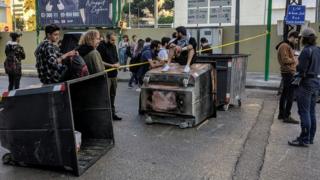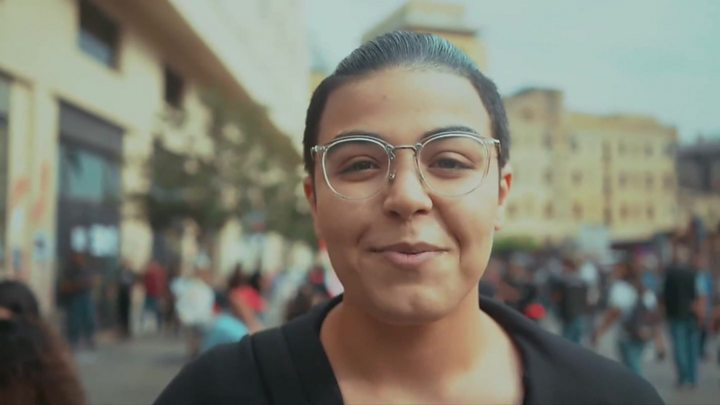
Protesters in Lebanon have blocked major roads for the first time in days after politicians failed to quell anti-government demonstrations.
Prime Minister Saad Hariri resigned last week, which was a key demand of the protesters, but President Michel Aoun has not yet started consulting parliamentary blocs about a successor.
Mr Aoun has said there are some "complications" to resolve.
Many of the protesters want the entire political system to be replaced.
They blame the political class for the corruption that plagues Lebanon, its stagnant economy and high levels of public debt, and the dire state of its public services.
Over the past two weeks hundreds of thousands of people have taken part in the demonstrations in a country with a population of only six million.
Following Mr Hariri's resignation on Tuesday, protesters dismantled the roadblocks in Beirut and other cities, in line with a request from the Lebanese army.
On Sunday, there was a large rally outside the presidential palace in the town of Baabda, south-east of Beirut, by supporters of Mr Aoun.
"I call on you all to unite," the president told them in a televised address, warning that no-one should put "one protest against another".
Mr Aoun said a plan had been drawn up to tackle corruption, revitalise the economy and build a civil state, which he said required a "big effort" to implement.
But hours later, tens of thousands of people took to the streets of central Beirut, calling on the president to resign and for the formation of a new, independent government to be sped up.
Early on Monday, protesters began blocking main roads in the capital again.
'The president has got to go'
By Raffi Berg, BBC News, Beirut
A calm atmosphere hangs over Martyrs' Square, where clusters of young people sit around among a jumble of tents.
While there's a lighter presence by day, they have been coming by their thousands at night, calling for total political change.
"This is not a protest, this is a revolution!" said one man, sitting under the highly symbolic Martyrs' Monument, a bronze sculpture now draped in a Lebanese flag. Declarations of intent by the president, he said, were not enough, adding: "The president himself has got to go."
Earlier, more protesters blocked roads leading to the Bank of Lebanon with overturned metal bins, directing their anger at the central bank governor over the country's spiralling debt.
Security forces, though, are also out in strength, watching from the side streets. Water cannon are parked on the approach to Martyrs' Square.
Despite political attempts to defuse the crisis, including the resignation of the government, the stand-off continues.
Lebanon's outgoing national unity government included representatives of most political parties, which are normally divided on sectarian lines.
Under the constitution, Mr Aoun must consult the various blocs in parliament for their choice of prime minister, a post that is reserved for a Sunni Muslim under the sectarian power-sharing system that ended the 1975-1990 civil war.

Media playback is unsupported on your device
Mr Hariri is reportedly ready to try to form a new government if he is allowed to appoint technocrats and quickly implement the reforms needed to resolve Lebanon's economic crisis.
Lebanon's debt is equivalent to more than 150% of gross domestic product (GDP), its economy has stagnated, and its currency recently lost value against the US dollar for the first time in two decades.
The country's public infrastructure, which was already stretched before more than one million refugees arrived from neighbouring Syria, is also ailing. Electricity and water supplies are disrupted frequently and rubbish often piles up on the streets.
